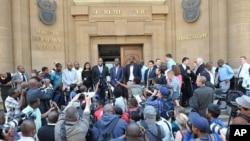A South African court has said that an anti-apartheid struggle song is hate speech and ruled that it may not be sung, in public nor in private. It is expected the decision will be appealed.
Justice Collin Lamont has ruled this song, often sung by Julius Malema, controversial head of the African National Congress Youth League, is hate speech. It includes the words “Dubula ibhuni” - which translate loosely to English as “Kill the Boer." Boer can mean farmer or it can mean white Afrikaners - particularly those who perceive themselves as the rightful custodians of their language and history.
But to black South Africans "ibhuni" does not necessarily mean Boer. It was often used to signify the apartheid government, and currently it is used to define whites who cling to the past. But Judge Lamont says to determine whether the song is hate speech, it is the view of those who see it as such that must be used.
“If the words have different meanings then each meaning must be considered and be accepted as a meaning," said Lamont. "The search is not to discover an exclusive meaning but to find the meaning the target group would reasonably attribute to the words.”
Many whites believe Malema sings the song to incite hatred. Some charge that it directly leads to murder, particularly of white farmers and their families.
Malema told the court he sings the 70-year-old song in the spirit of its anti-apartheid struggle meaning, and vehemently denied he intends to incite hatred and violence. But this explanation was rejected by the judge who noted that he often makes shooting hand gestures when singing, and that he also uses anti-white slogans in his songs and speeches. He said that hate speech negatively impacts both those making it and those it targets.
“All hate speech has an effect. Not only upon the target group but also upon the group participating in the utterance," said Lamont. "That group and its members participate in a morally corrupt activity which detracts from their own dignity. It lowers them in the eyes of right-minded, balanced members of society who then perceive them to be social wrongdoers. "
But the ruling is already being questioned by free speech activists and some lawyers as potentially infringing on the constitutional right to free speech. In an earlier interview, Barney Pityana, former head of the constitutionally mandated Human Rights Commission, told VOA such issues should really be addressed by political leaders.
“I don’t personally think you address that by banning, I think you address that by being responsible politicians," said Pityana. "So we need a kind of maturity that says that responsible leadership requires at times restraint, it also requires leadership, it requires guidance, it requires an understanding, a maturity that understands the impact of every word that we utter, whether in song, or in jest, whatever way, if you are a leader of a political party, words matter. Your every word you utter, matters."
The youth league has already indicated it intends to appeal the ruling.
South Africa High Court Rules Struggle Song Is Hate Speech




